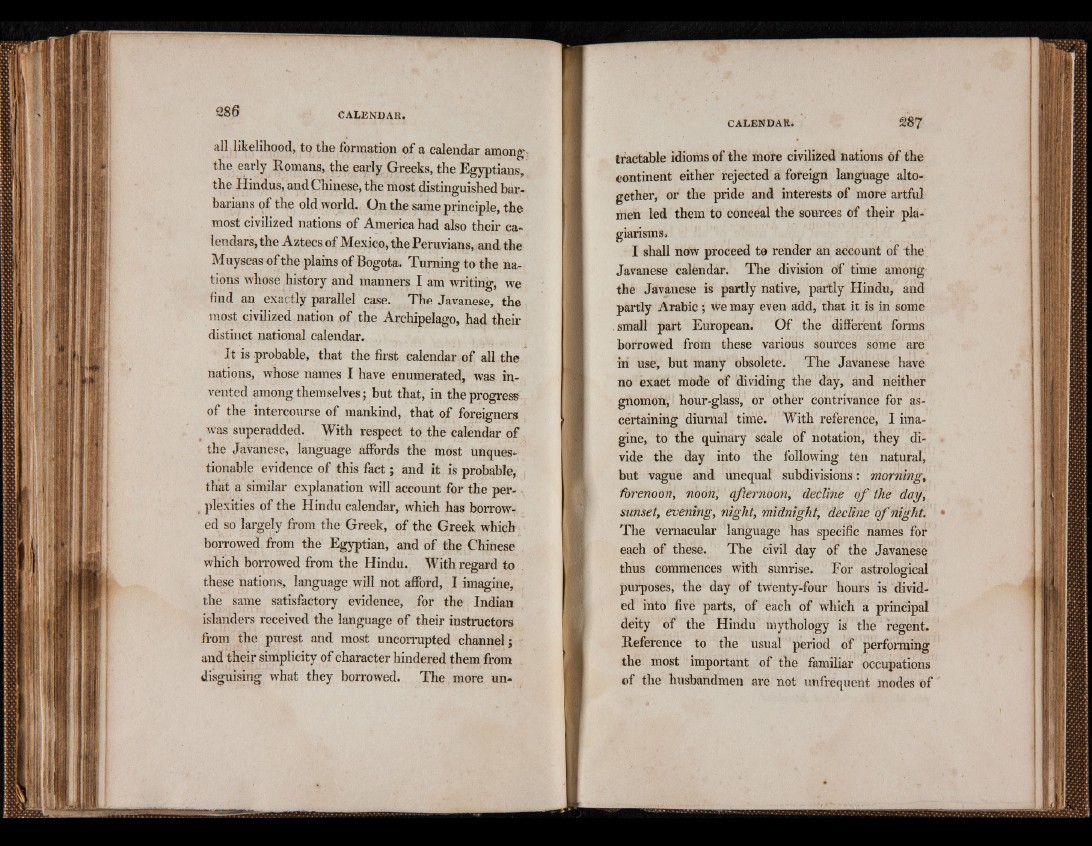
all likelihood, to the formation of a calendar among
the early Romans, the early Greeks, the Egyptians,
the Hindus, and Chinese, the most distinguished barbarians
of the old world. On the same principle, the
most civilized nations of America had also their calendars,
the Aztecs of Mexico, the Peruvians, and the
Muyscas of the plains of Bogota. Turning to the nations
whose history and manners I am writing, we
find an exactly parallel case. The Javanese, the
most civilized nation of the Archipelago, had their
distinct national calendar.
It is probable, that the first calendar of all the
nations, whose names I have enumerated, was invented
among themselves ; but that, in the progress
of the intercourse of mankind, that of foreigners
was superadded. With respect to the calendar of
the Javanese, language affords the most unquestionable
evidence of this fact; and it is probable,
that a similar explanation will account for the per-
plexities of the Hindu calendar, which has borrowed
so largely from the Greek, of the Greek which
borrowed from the Egyptian, and of the Chinese
which borrowed from the Hindu. With regard to
these nations, language will not afford, I imagine,
the same satisfactory evidence, for the Indian
islanders received the language of their instructors
from the purest and most uncorrupted channel;
and their simplicity of character hindered them from
disguising what they borrowed. The more untractable
idioms of the more civilized nations of the
continent either rejected a foreign language altogether,
or the pride and interests of more artful
men led them to conceal the sources of their plagiarisms.
I shall now proceed to render an account of the
Javanese calendar. The division of time among
the Javanese is partly native, partly Hindu, and
partly Arabic; we may even add, that it is in some
small part European. Of the different forms
borrowed from these various sources some are
in use, but many obsolete. The Javanese have
no exact mode of dividing the day, and neither
gnomon, hour-glass, or other contrivance for ascertaining
diurnal time. With reference, I imagine,
to the quinary scale of notation, they divide
the day into the following ten natural,
but vague and unequal subdivisions: morning,
forenoon, noon, afternoon, decline o f the day,
sunset, evening, night, midnight, decline o f night.
The vernacular language has specific names for
each of these. The civil day of the Javanese
thus commences with sunrise. For astrological
purposes, the day of twenty-four hours is divided
into five parts, of each of which a principal
deity of the Hindu mythology is the regent.
Reference to the usual period of performing
the most important of the familiar occupations
of the husbandmen are not unfrequent modes of